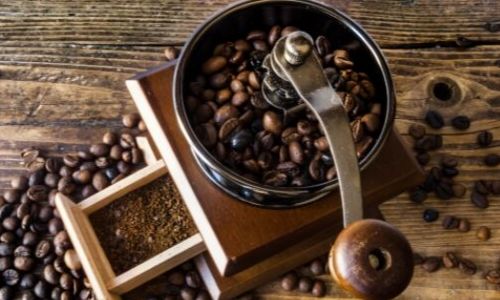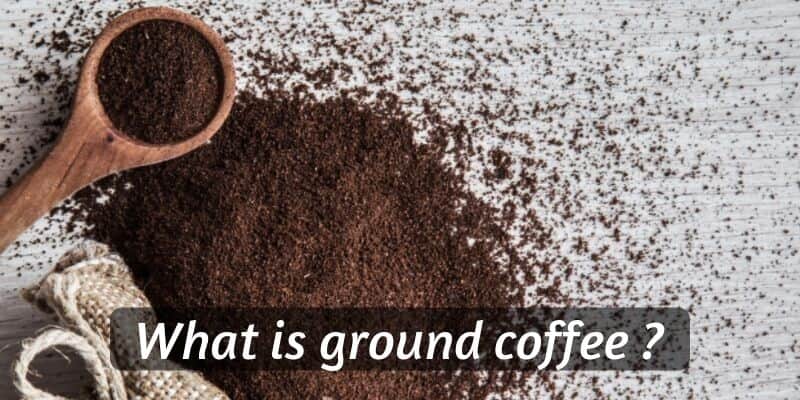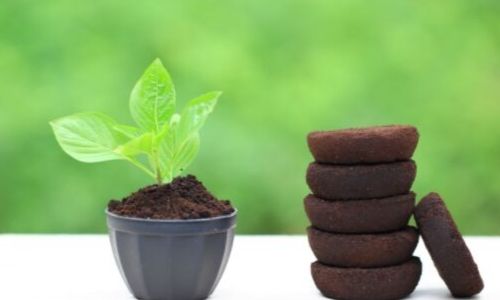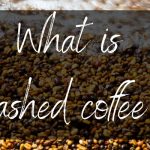New to coffee ? We all have to start somewhere, and ground coffee is probably the best place.
After all, we've all seen brewed coffee, but ground coffee a bit less. Or, you might just find you you've always been looking at it, and didn't know it.
Table of Contents
So what is ground coffee ?
Ground coffee is what brewed coffee is made of. It's made up of ground coffee beans, much like flour is made of wheat and maize is made of corn.
You use ground coffee like you would use a tea bag: add hot water to it, let it steep for a few minutes, then strain and drink. The resulting brew is what we all know as coffee.
Ground coffee comes in several sizes, depending on what kind of coffee you're planning to make. We'll get tot hat in a bit.
Until then though, we need to stress that ground coffee is not instant coffee. It looks very similar, and they might even smell the same. But there is a big difference, and trying to make an espresso with instant coffee instead of ground coffee will be a failure.
If you want to make the best coffee at home, you absolutely need to check my article on the best coffee gear.
Coffee grind sizes
There's several grind sizes for coffee, and they each have their use in the grand scheme of things.
Some kinds of coffee, like the Turkish coffee, keep using a specific size partly because of tradition, so it's not always about functionality.
The sizes range from very small, almost like a powder (for Turkish and Espresso) to coarse ground (for French press, and cold brew).
Whichever you sue depends on what you're going to use, since grind size can and does influence the taste of your coffee.
So you've got:
- very fine, almost powdery
- medium-fine, what is usually in filter coffee and Moka
- medium size, still good for filter and Moka
- medium-coarse, better for pour-over
- coarse, for French press and cold brewing (long brew times)
Is fresh ground better than pre-ground ?
Yes, the fresher the coffee the better the brew. So this means that freshly ground coffee will get you a fresh cup of coffee, that's going to be more flavorful than anything you've ever had with the pre-ground stuff.
That being said, most coffee bags state the roasting date and level (that's important too), but not many state the date the beans were ground on.
If the coffee does have a lot number, it should also have a lot date. I think it would be safe to assume that the coffee was ground on that day, and you can guide yourself by that.
In general, pre-ground coffee is tightly sealed, vacuum sealed actually. So it will retain most of its flavor by the time you open it. It loses it quickly if you don't store it properly though !
What is coffee bloom ?
When your coffee is fresh, it will make a sort of foam when hot water touches the ground coffee. This is because the coffee suddenly expands (a little) and releases some CO2, which interacts with the natural fats in the coffee, and produces that foam.
It's a good and reliable sign that the coffee you're using is fresh. You'll mostly be able to see this with pour-over coffee, and with French press, since other brewing methods won't show you the coffee itself, only the brew.
The best version is freshly ground coffee, and that usually means making it yourself.
Should you grind your own coffee ?
Yes. If time is on your side, and you're willing, then you should definitely grind your own coffee instead of using pre-ground. Why do I talk about time and willingness ?
Well, standing there and grinding coffee beans each morning might sound like a very pointless and time consuming task when every little minute counts. And what you'd rather still be sleeping.
But if you're looking for great coffee, then making the effort to grind it at least the night before (right before going to bed) and locking it into an airtight container (like those tiny tea caddies) is going to be important.

Some grinders are electric and will do the work for you, and some are manual, requiring you to work it yourself. It's up to you which sounds better, but both are useful.
There are some espresso machines that have a built-in grinder. I for one try to stay away from those, and I'll tell you why. They might sound like a good idea at first. Just dump in all the coffee beans and the machine will take care of the rest.
But espresso machines that do that are professional machines (most of the time), meaning they get very hot (as they should). That heat can and will transfer to the grinder, which is always going to have a bit of leftover coffee dust and coffee oils from the other times it ground your coffee.
All I'm saying is those things build up, and need to be cleaned or the burrs/blades changed every so often, just to make sure you get clean coffee. To me that's just complicating things, since cleaning a grinder that's separate from the espresso machine is simpler.
Speaking of grinders, let's talk blades vs burr a bit.
You've got two options when it comes to how your coffee is ground: either you've got a burr grinder, or a blade grinder.
A blade grinder (kind of like a blender) will get you the finest grind ever, to the point where it might start to clump together. Hard to manage if you're looking for larger grinds, or anything bu fine grinds.
A burr grinder has two stones/burrs that crush the coffee beans to the size you want them to be. The coffee ends up uniform in size, and there are no too-small bits.
Best coffee grinder for all sizes
If you're still wondering which grinder would be best for your needs, then take a look at this burr grinder by OXO.
It's an automated coffee grinder, so this means you'll be able to let it do its thing while you brush your thing or do something else in the morning.
There's 15 settings to choose from, so I think you will find the right one for you and your coffee needs.
A burr grinder, meaning your ground coffee will end up all the same, and it won't trap any coffee in odd places either, since it's easy to open and clean.
The hopper holds up to 0.75 pounds of coffee beans, which means you can grind for the entire week ! I don't know about you but that sounds convenient to me, especially with a small container to keep the ground coffee in.
It's a heavier grinder, which is reasonable given that it's got to keep in place when it's working. So you can be sure your grinder won't waddle off the counter at some point.
You can check the listing on Amazon here, and read the reviews as well.
Is ground coffee good for plants ?
Yes, ground coffee is good for plants as it has a series of vitamins, minerals, which all encourage the plant to grow. However the caffeine content can be a bit harmful, if you layer a thick blanket of ground coffee on and around your plants.
Should you use fresh or leftover ground coffee ?
Well, the general consensus is that leftover ground coffee is better, since the caffeine is mostly gone and there are enough nutrients in the grounds to warrant using them as bio-degradable compost.
Still, using leftover ground coffee means you lose out on the nitrogen contained withing coffee, which is mostly gone after using the coffee.
Even so, whichever kind of ground coffee you use, it's better to mix it with some plant soil or compost or leafmold before sprinkling it on and around the plants.
Remember to use a thin layer, in case your plants become sensitive to the coffee. If you've got plants like azalea and blueberries that love acidity, they should be fine.
So if you've got some leftover ground coffee, go right ahead and help your plant grow !
Can I reuse ground coffee ?
No, reusing ground coffee will not give you a good cup of coffee. It will get your a muddy cup of brown water, and you'll be very disappointed by the results.
Reusing ground coffee is not like reusing tea leaves.
Aside from using leftover ground coffee as compost or slow release fertilizer for your plants, you can use the the grounds for a body scrub, or mix them into some handmade candles or soap for a nice scent (and tint).
Final thoughts
Ground coffee and all its forms and uses is a crucial element that any coffee lover ought to know. So now that you know what kind of coffee grind sizes there are, how they're used, and even how to reuse ground coffee, you've got the basics down pat.
If you want to know more about coffee or tea, feel free to check the related articles below. Who knows what else you might find ?







